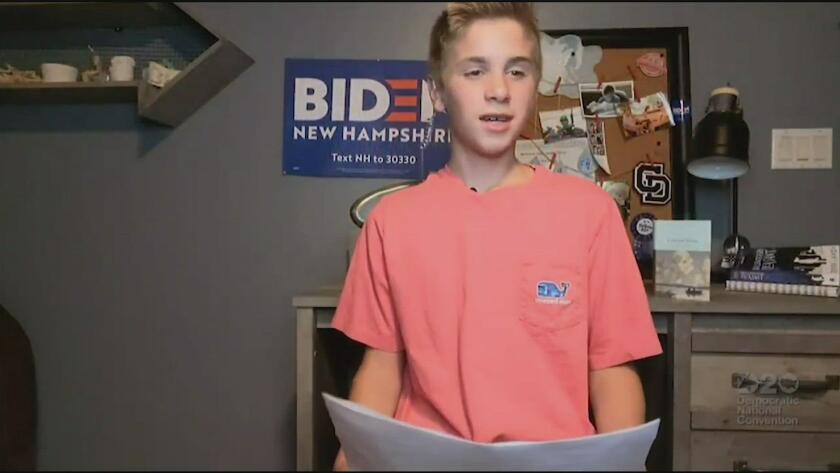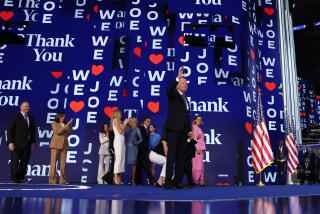Commentary: As someone who stutters, let me tell you why Biden fan Brayden Harrington is a hero
- Share via
13-year-old Brayden Harrington spoke at Thursday night’s Democratic National Convention
- Share via
In a convention filled with stirring testimonials, apocalyptic warnings and soaring appeals to unity, a 13-year-old with a stutter made the most eloquent case for why Joe Biden should be the next president of the United States.
It boils down to common humanity.
Brayden Harrington, an adorable kid in a T-shirt who looked like he might have cleaned up after a day at Little League, shared what he took away from a conversation with Biden when the two met in February at a campaign event in Concord, N.H. Brayden’s two-minute speech on Thursday, coming before the video introduction to Biden’s big address, was the most gripping theatrical moment of a four-day virtual convention widely hailed as a television success.
After introducing himself, Brayden admitted with a bashful laugh, “Without Joe Biden, I wouldn’t be talking to you today.” Biden, he said, told him that, as people who stutter, they belong to the same club. That someone who also had trouble speaking could grow up to be vice president (and quite possibly president) filled the youngster with unlimited hope.
The mark of memorable speechmaking, as Michelle Obama demonstrated on Monday night, lies in something rawer than verbal felicity or elocutionary finesse. Brayden inhabited the truth of his words. His voice bore witness to the sentiments he was expressing even when his voice slipped from his control.
As someone who stutters, I found Brayden’s courage remarkable. I have never given a national address — I’m not that brave — but I do a fair amount of public speaking, so I know what Brayden was facing when the cameras were on him. I’d call the speech an unqualified success, but let me try to explain what Brayden was experiencing when he skidded on the “s” of stuttering, stumbled on the phrase “vice president” and got stuck on the word “about.”
13-year-old Brayden Harrington spoke at Thursday night’s Democratic National Convention
Speech is a complicated neurological system that involves the vocal folds, an array of delicate muscles and our breath. A glitch in the brain circuitry causes the system to jam. The block is detectable by the speaker milliseconds before vocalization is attempted. The body’s natural instinct is to break through the barrier, to override it by pushing harder, but force only prolongs the difficulty.
Speech therapy trains the stutterer to reset. I was taught to exhale, take another breath and start again. It’s good advice, but the trouble is that blocks aren’t always easily cleared and conversational pressure — the pressure not to leave an unspoken word dangling in the air — can exert additional stress on an already overtaxed system. The nightmare for every stutter is being stranded on the cliff of a consonant so long that one can only abandon the climb in defeat.
Now imagine you had a neurodevelopmental disorder that was tagged in popular culture as a joke. (I can still feel the flush across my face as strangers surrounding me exploded in laughter at the stuttering gags in “A Fish Called Wanda” and “My Cousin Vinny.”) Imagine also a disability so poorly understood that grandmothers will kindly dismiss it as a passing stage (“he thinks faster than he can speak!”) and therapists will do all they can to convince you that the problem lies in your unconscious rather than in, what scientists are coming to understand, your basal ganglia.
For Brayden to deliver a speech of this magnitude he had to navigate two gulfs: the physical gulf within himself and the gulf between himself and an anonymous public, whose reaction to communication snafus is unpredictable and not always patient or friendly.
There’s actually a third gulf, which may be the hardest to confront, between the image one wants to preserve of oneself as capable and unimpeded and the reality of one’s experience in the world. It was here that Biden laid down a bridge, sharing with his young friend how he learned to deal with his problem by reading from Yeats’ poetry aloud and by marking up his speeches in such a way as to ease his journey through them.
Brayden showed us the way he marked up his big speech just like Joe taught him. Stuttering afflicts roughly 3 million Americans, but it’s hard to imagine anyone not relating to a young person trying to overcome what can feel like an insurmountable obstacle. According to the CDC, nearly 1 in 4 adults has some type of disability, many of which are more easily hidden than stuttering but still a potential cause of shame and isolation.
Biden often repeats the advice he got from his mother: “Joey, no one is better than you. Everyone is your equal, and everyone is equal to you.” These words animated the message he tried to instill in Brayden, who made the most of his opportunity in speaking before the nation.
Never in the history of this disorder has there been a more emotionally powerful public service message. Yes, that includes “The King’s Speech,” a film with good intention but one beholden to formulaic uplift, a mode of storytelling that is too simplistic for a lifelong challenge like stuttering. Even I, who have been roughly talking my way through life for more than half a century, felt a sense of relief and profound gratitude for Brayden’s humanizing example.
Trump has made fun of Biden’s challenge. “The man can’t speak,” the president declared on Fox News, desperately looking to disqualify his opponent. I remember bullies like Trump in school. He was the guy who would mimic my speech in class for a cheap laugh, then try to cheat off me during the social studies midterm.
When Trump mocked Serge F. Kovaleski, a New York Times reporter with a disability, during a 2015 campaign rally by doing a series of spastic arm movements, it seemed to be a new low in politics. Meryl Streep called Trump out at the Golden Globes in 2017 for this incident in a speech that reminded America of the corrosiveness of his behavior:
This instinct to humiliate, when it’s modeled by someone in the public platform, by someone powerful, it filters down into everybody’s life, because it kinda gives permission for other people to do the same thing. Disrespect invites disrespect, violence incites violence. And when the powerful use their position to bully others, we all lose.
A void of empathy, Trump has shown a callous disregard for children separated from their parents at the border, for the Black and brown victims of police violence and for the more than 170,000 Americans who have died in this mismanaged pandemic. “When someone shows you who they are, believe them the first time.” One wonders how many thousands of times Trump will have to reveal himself before Maya Angelou’s wisdom will finally be heeded.
“I’m just a regular kid, and in a short amount of time Joe Biden made me feel more confident about something that bothered me my whole life.” To deliver these simple words, Brayden had to summon extraordinary resolve. “Pure, unvarnished courage,” tweeted journalist Dan Rather. Last night Brayden and Biden reminded us that heroism begins with compassion.
Deconstructing the lampooning powers of Sarah Cooper and J-L Cauvin, who do Trump better than Trump himself.
More to Read
The biggest entertainment stories
Get our big stories about Hollywood, film, television, music, arts, culture and more right in your inbox as soon as they publish.
You may occasionally receive promotional content from the Los Angeles Times.













